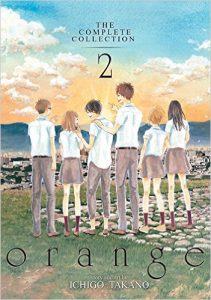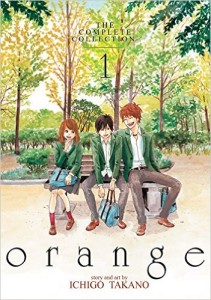By Ichigo Takano. Released in Japan by Futabasha, serialized in the magazine Manga Action. Released in North America by Seven Seas. Translated by Amber Tamosaitis. Adapted by Shannon Fay.
When orange ended its main run, it was a somewhat ambiguous open ending which I praised at the time. The point of the series was not about whether Naho and Kakeru would hook up, it was about facing down Kakeru’s suicidal thoughts and actions, and an examination of how you can sometimes try your hardest with good intentions and still have it not be enough. When word came out that a 6th volume was being released (which is coming out over here separate as ‘future’), I admit I expected that after such a serious and frequently tear-jerking story, we would finally get a light and fluffy series of side-stories, maybe get romantic resolution to the main pairing. And technically we do get the latter, but I probably should not have been too surprised that orange: future is not interested in sweet fluffiness, but instead continues to examine our decisions and their consequences, in both the world where Kakeru killed himself and the world where he was stopped.
That’s Suwa on the front cover, and indeed Suwa is on the back cover. And throughout the book. This final volume is an examination of Suwa and his burgeoning love for Naho. We begin with the ‘epilogue’ to the main series, where Kakeru has been saved and Naho is clearly going to end up with him. It’s made clear that Suwa’s letters from his future self clearly said he and Naho were married now, but that he should save Kakeru anyway. Suwa, who tends to reflect on his own actions a bit too much, sees future Suwa as a bit of a jerk for stepping in and stealing Naho after everything that happened, and it’s up to his friends to explain that the Suwa they know isn’t like that at all. It’s a nice little bittersweet epilogue, but it only takes up about a quarter of the book. The majority of the book explores what actually did happen in that world where Kakeru wasn’t saved.
As I said before, the entirety of this volume is focused on Suwa and his perspective on things. This allows the reader to gain a greater appreciation of the character (and he was already one of my favorites) and shows us how just because you realize that the girl you love is in love with someone else, it doesn’t mean that your love moves on. The main issue with this volume, I think, is that we don’t get Naho’s perspective on things at all, which can make the ultimate decisions she makes look a bit out of the blue. This fits well with Suwa’s POV – he’s trying his hardest, but from what he can see Naho just isn’t responding – but from a reader perspective we agree with him, and wonder what led her to her decision. That said, I have no real complaints, mostly as I simply enjoy the way that Takano tells the story, and the emotions feel very real and earned.
If you enjoyed the initial orange onmibuses, this is clearly a must buy. But be aware that it’s not going to be happiness and sweets. Also, loved the inside cover art showing the cast in their future professions. Also also, Azusa and Takako are the absolute best.



